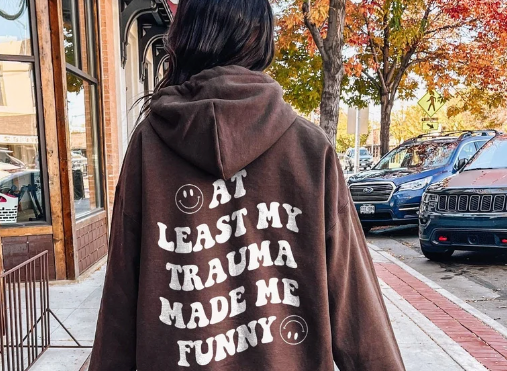EDITOR’S CORNER
Do mental health awareness campaigns always help? Can they sometimes hurt? And when it comes to youth, can programs intended to find and aid kids in severe mental and emotional states wind up convincing those in less-severe states that they have some disorder? And in an odd way, has the concept creep — and beyond that, culture creep — of mental health awareness contributed in making such disorders not just socially acceptable but, well, hip?
UK psychologist Lucy Foulkes touched on all such points in her recent conversation with Jerusalem Demsas on The Atlantic’s ‘Good on Paper’ podcast (which I excerpted in an Around The Web). As a researcher working in schools, she told him, she was “observing what teenagers were being taught in schools about mental health. . . Quite early on, I was interested in the fact that young people are learning about mental health now in a way that my generation never learned about in school.”
In cyberspace and in three dimensions, mental health info is everywhere, all of the time, reaching everyone — or trying to, whether people are in crisis or not. As a result, the number of kids, teens, and young adults either formally diagnosed or simply self-identifying with a disorder has skyrocketed, making it the new normal. Here on Mad in America and Mad in the Family, Zoe Cunniffe wrote about the “Tiktokification” of mental health on college campuses, the influence of social media, and the explosion in self-diagnosis; her follow-up story looks at how students can feel dismissed by the medical model, as the complexity of human experience is too often ignored within the current narrative.
 But that narrative dominates and shapes the new normal, ramping up the emphasis on diagnoses — and bringing more and more kids into the loop. Mental-health efforts created to identify youths in crisis can end up influencing, molding, even defining a broader and broader slice of the population.
But that narrative dominates and shapes the new normal, ramping up the emphasis on diagnoses — and bringing more and more kids into the loop. Mental-health efforts created to identify youths in crisis can end up influencing, molding, even defining a broader and broader slice of the population.
As a result, Foulkes said, “I had a parent after a talk say to me that her teenage daughter felt left out because she was the only one in her peer group who didn’t report having anxiety or depression. You can get all kinds of interesting merchandise on Etsy. I saw there are badges that can say, you know, I have anxiety, and a little heart. Or you can get—the latest I saw was a hoodie that says, Hot girls take antidepressants.”
On X, formerly known as Twitter, Foulkes tweeted out images of that and similarly emblazoned merchandise. Among the photos: a sweatshirt declaring Hot girls have anxiety; a t-shirt saying MY ANXIETY IS CHRONIC BUT MY ASS IS ICONIC (along with a drawing of a teddy bear — go figure); and a hoodie with smiley faces shouting AT LEAST MY TRAUMA MADE ME FUNNY.
Regarding the last one, Foulkes says in her thread: “Maybe some people find these products helpful, who knows. But if I was experiencing any of this stuff I’d find it pretty distressing and frustrating to see it being made light of in this way.”
And that’s the thing that gets me. As anyone knows who struggles mentally themselves or loves someone who does (or did), such agony is not to be taken lightly. Yes, people can claim labels as their own; yes, some can even find something freeing and affirming in them, perhaps leading to greater empowerment, understanding of themselves, and connection with others in similar states.
At the same time, reducing any form of suffering to some jokey little slogan on the back of a hoodie — even worse, one that reduces its wearer to a sex object — is not an end result that anyone can celebrate. Minimizing trauma, even making it cute, is not the goal of mental-health awareness efforts, and such campaigns are certainly not the only factor contributing to this wide cultural shift in attitudes toward psychiatric diagnoses and the ever-increasing numbers of youths who embrace them. Social media, for one, has a massive influence, as Cunniffe detailed in her previous story.
But one way or the other, whatever the tangle of causes, such cultural minimizing is reason for concern. We shouldn’t be laughing at people in pain. We shouldn’t be objectifying them in any manner.
Instead, we should be seeing them as human.
—Amy Biancolli, Family Editor
***
More from Mad in the Family
More Editor’s Corners















Where can I get this sweatshirt?
Report comment
Maybe the reason so many are self diagnosing themselves with mental illnesses are because they truly have them. Possibly not what they’re self diagnosing as but more than likely something. Why do you think this Country and World is the way it is? Suicide, random acts of violence, obesity, domestic abuse, mass shootings all of these indicate mental illness, often times left untreated or poorly treated. With social media, as well as media itself affecting so many, undiagnosed or unwilling to accept their own diagnosis parents raising children and leaving them with trauma due to untreated mental illness. It makes complete sense that we as parents are raising children with anxiety, depression, bipolar, eating disorders etc etc. Also considering the fact that our Children are growing up in a World like this it makes even more sense they have anxiety. I was diagnosed with bipolar mixed in 1999, when I was the age of 19. I have continued treatment and stayed in remission for most of my adult life, with the exception of post pardon issues. My life is good, 23 years of marriage with 4 successful children,2 of which are on their by ways to receiving their bachelors, the other 2 still in Middle and High school.I am balanced taking care of me and very active in my children’s life and school as I always have been. All of these things were made possible because I embraced my diagnosis. I am happy and feel support because of the items I see embracing what was once seen and still often times seem as a stigma. My 2 daughters also have bipolar, one has bp 1 and the other bp 2. But they haven’t missed a beat and been extremely successful in school as well as their careers. In my opinion it’s much better to have more people self diagnosing than not enough people accepting their diagnosis and continuing to do damage to our youth causing a vicious cycle that we’ve been on for way to long.
Report comment